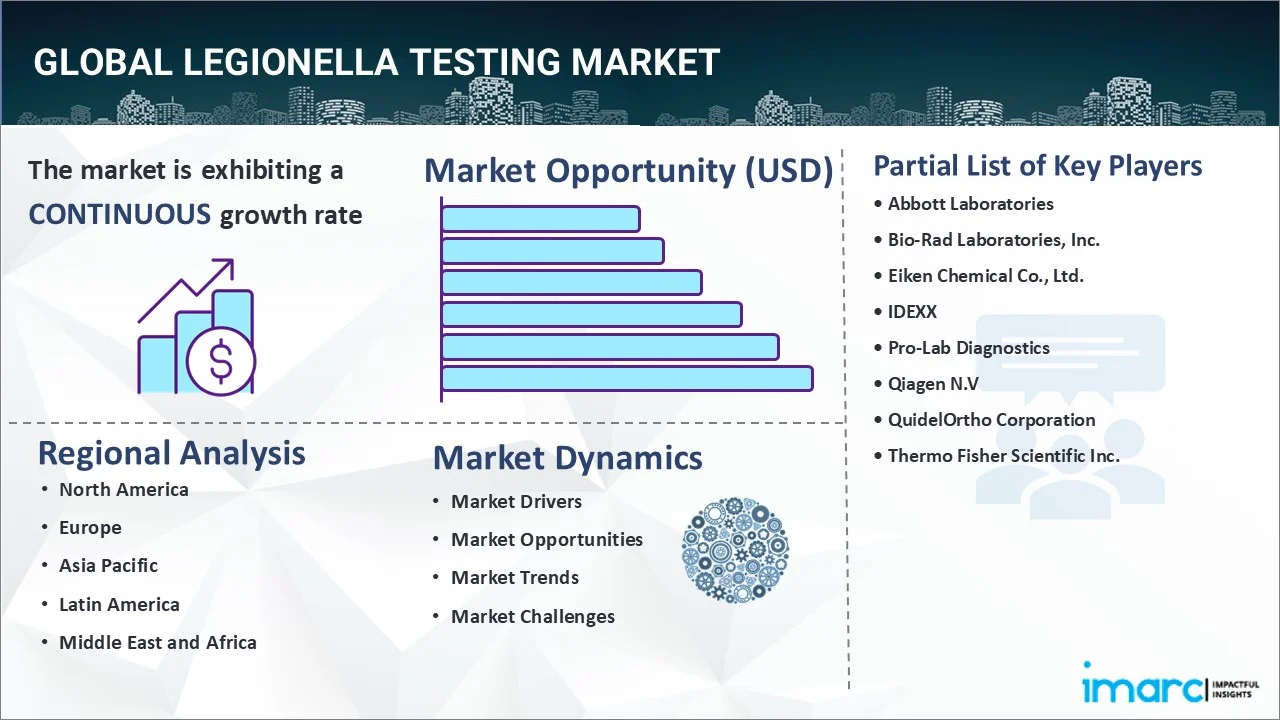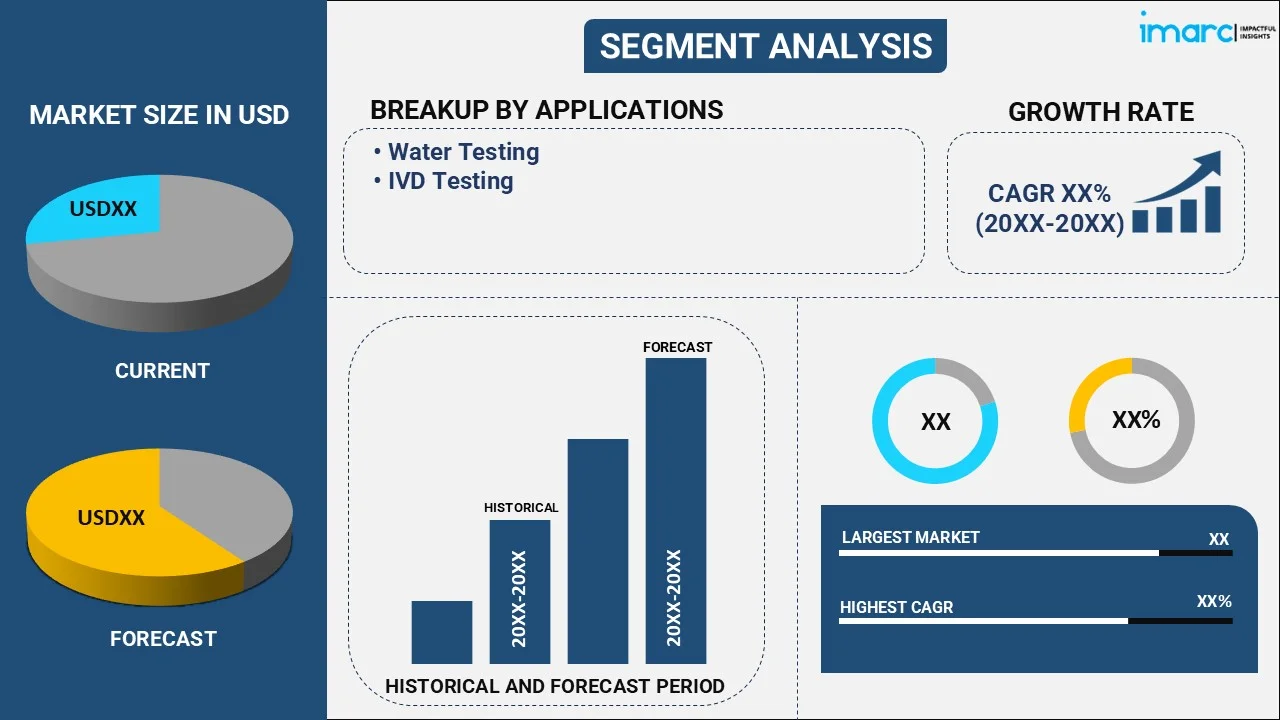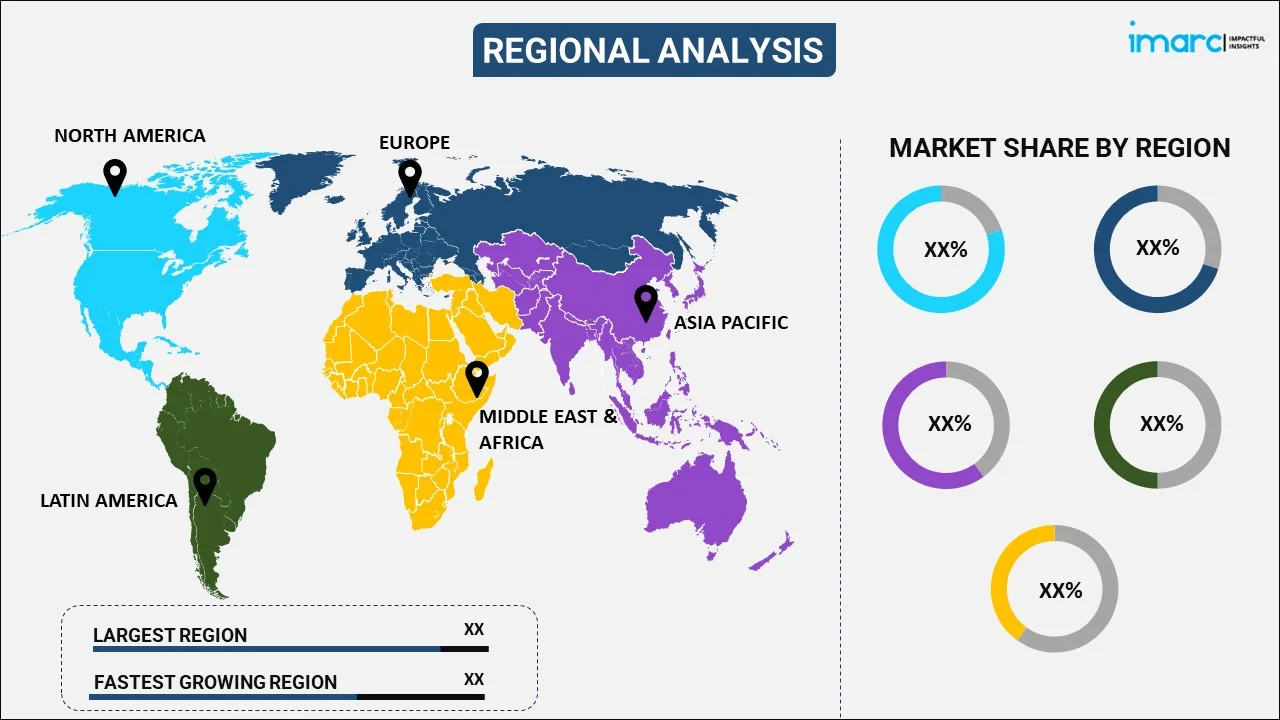
Legionella Testing Market Report by Application (Water Testing, IVD Testing), End User (Diagnostic Laboratories, Hospital and Clinics, and Others), and Region 2025-2033
Global Legionella Testing Market:
The global legionella testing market size reached USD 366.5 Million in 2024. Looking forward, IMARC Group expects the market to reach USD 658.2 Million by 2033, exhibiting a growth rate (CAGR) of 6.66% during 2025-2033. The increasing number of individuals who have diabetes, kidney disease, human immunodeficiency virus (HIV), cancer, or other chronic illnesses, are at risk of hospitalization, which is stimulating the market growth..
|
Report Attribute
|
Key Statistics
|
|---|---|
|
Base Year
|
2024
|
|
Forecast Years
|
2025-2033
|
|
Historical Years
|
2019-2024
|
|
Market Size in 2024
|
USD 366.5 Million |
|
Market Forecast in 2033
|
USD 658.2 Million |
| Market Growth Rate 2025-2033 | 6.66% |
Legionella Testing Market Analysis:
- Major Market Drivers: The increasing demand for legionella testing in workplace buildings is one of the primary drivers bolstering the market. Besides this, the launch of favorable policies by health agencies to develop an effective water safety plan (WSP) is also acting as another significant growth-inducing factor.
- Key Market Trends: Recent clinical trials on treatment and diagnostic strategies for adult patients with community-acquired pneumonia are positively influencing the market. Moreover, extensive investments in R&D activities are further stimulating the market growth.
- Competitive Landscape: Some of the prominent players in the global market include Abbott Laboratories, Bio-Rad Laboratories, Inc., Eiken Chemical Co., Ltd., IDEXX, Pro-Lab Diagnostics, Qiagen N.V, QuidelOrtho Corporation, and Thermo Fisher Scientific Inc., among many others.
- Geographical Trends: Europe exhibits a clear dominance in the market. This can be attributed to the growing number of public health campaigns and educational programs, which is escalating the demand for legionella testing services. Moreover, the increasing focus among key players on maintaining high standards of patient care and safety is bolstering the regional market.
- Challenges and Opportunities: The complexities and high cost of legionella testing procedures are among the primary factors hindering the market growth. However, the introduction of simpler and more cost-effective testing kits that can help in making legionella testing more accessible is expected to fuel the market over the forecasted period.

To get more information on this market, Request Sample
Legionella Testing Market Trends:
Rising Prevalence of Legionellosis
The rising incidences related to Legionellosis disease, which is a pneumonia-like illness, usually caused by a bacterium that varies in severity from mild to severe illness and sometimes fatal form of pneumonia, are propelling the market. For example, in September 2023, a total of 166 cases of legionellosis, including 23 deaths, were reported from Poland. Additionally, in May 2023, the Lithuanian National Public Health Center reported the investigation of an unexpected number of cases of Legionnaires’ disease in the Kaunas district of Lithuania, Europe. In line with this, Legionella bacteria was found in water samples from the buildings where the cases resided. Furthermore, the proliferation of Legionella-causing bacteria that are commonly found in several artificial and natural aquatic environments, such as respiratory therapy equipment, fountains, misting devices, cooling towers, spa pools, and water systems in hotels, homes, factories, etc., is also catalyzing the legionella testing market outlook. For instance, in July 2022, the Pennsylvania Department of Health received two reports of laboratory-confirmed Legionnaires disease in patients who received lung transplants from the same donor at a single Pennsylvania hospital. The donor’s cause of death was freshwater drowning in a river, raising suspicion of potential donor-derived transmission because Legionella bacteria naturally live in fresh water. As a result, health agencies in various countries are launching an effective water safety plan (WSP) to reduce the proliferation of Legionella in the water. Some of the common rules and regulations pertinent to the disease include the Surface Water Treatment Rule (SWTR) and the Safe Drinking Water Act (SDWA).
Various Technological Advancements
The increasing number of clinical trials on diagnostic and treatment strategies for patients with community-acquired pneumonia is strengthening the market. Key players in the healthcare industry are focusing on introducing novel molecular diagnostics and rapid test methods, as they offer more accurate and quicker testing outcomes, thereby improving the efficiency of legionella testing and control strategies. For example, in December 2023, one of the diversified biotechnology companies, CCM Biosciences (CCM Bio), launched its business unit, CCM 5Prime Sciences (5Prime), focused on the globally commercialized and multiple patent-protected compositions for next-generation DNA sequencing and molecular diagnostics. Apart from this, sensitive and rapid PCR-based methods are gaining immense traction as alternatives to the conventional culture system for the detection of slow-growing bacteria, such as Legionella spp. They use specific fluorescent probes that allow them to detect bacteria in water samples. Prominent brands, including Biopremier, offer simple, reliable, and rapid procedures, including real-time PCR detection test kits, to detect Legionella spp. Moreover, the widespread integration of technologies, such as artificial intelligence (AI), to identify and predict potential legionella outbreaks by analyzing data trends, including flow rates and water temperature, is elevating the legionella testing market share. For example, in May 2024, the Dubai Central Laboratory introduced a new artificial intelligence (AI) technology to seamlessly detect Legionella, a bacterium that causes acute respiratory infections.
Growing Regulatory Standards
Regulatory and government bodies across the globe are implementing stricter drinking water standards and regulations to control legionella outbreaks, especially in hotels, healthcare facilities, public buildings, etc. These regulations mandate regular risk and water testing assessments to ensure public safety, thereby escalating the demand for legionella testing services. For example, in April 2024, the U.S. Environmental Protection Agency (EPA) released the first-ever National Primary Drinking Water Regulation for certain per- and polyfluoroalkyl substances (PFAS), also known as ‘forever chemicals.’ Besides this, for drinking water, the World Health Organization (WHO) suggests that Legionella bacteria should be absent in water utilized for human consumption. Numerous guidelines, often set by local authorities or industry standards, indicate acceptable levels and testing protocols. They generally involve implementing measures and monitoring Legionella counts to ensure they remain below certain thresholds to reduce associated health risks. For instance, in the United States, the Centers for Disease Control and Prevention (CDC) provides guidance on Legionella testing and management for several water systems. Furthermore, other organizations, such as the American Society of Heating, Refrigerating and Air-Conditioning Engineers (ASHRAE), provide recommendations for action levels related to this infection. Consequently, facility managers are taking corrective actions to protect the health of occupants. Some of the leaders in providing innovative solutions, including IWC Innovations, offer expertise in Legionella risk mitigation, focusing on investigation, detection, prevention, and remediation of the disease.
Legionella Testing Market Segmentation:
IMARC Group provides an analysis of the key trends in each segment of the market, along with the legionella testing market forecast at the global, regional, and country levels for 2025-2033. Our report has categorized the market based on the application and end user.
Breakup by Application:

- Water Testing
- Microbial Culture
- DFA Stain
- PCR
- Others
- IVD Testing
- Blood Culture
- Urine Antigen Test
- DFA Stain
- PCR
- Others
Currently, water testing holds the majority of the market share
The report has provided a detailed breakup and analysis of the market based on the application. This includes water testing (microbial culture, DFA stain, PCR, and others) and IVD testing (blood culture, urine antigen test, DFA stain, PCR, and others). According to the report, water testing represented the largest legionella testing market segmentation.
The increasing need for comprehensive and regular water quality assessments in several facilities, including hotels, commercial buildings, hospitals, residential complexes, etc., where stagnant water can become a breeding ground for legionella bacteria is driving the growth in this segmentation. Moreover, the widespread adoption of water testing methods that can allow for timely intervention measures is also acting as another significant growth-inducing factor. For example, in May 2022, ChemREADY, one of the manufacturers of water and wastewater treatment chemicals, introduced its Legionella testing services and product line to mitigate water-borne infection in building water systems. Besides this, the growing number of educational and training programs for building owners, employees, facility managers, etc., is creating lucrative opportunities for water consulting and testing services. For instance, in June 2023, Consulting and Testing Services, Inc. (CTSI), one of the prominent providers of industrial hygiene, offered infection control and environmental testing services in New Jersey to identify sources of Legionella bacteria to support water management programs.
Breakup by End User:
- Diagnostic Laboratories
- Hospital and Clinics
- Others
Among these, diagnostic laboratories currently account for the largest market share
The report has provided a detailed breakup and analysis of the market based on the end user. This includes diagnostic laboratories, hospital and clinics, and others. According to the report, diagnostic laboratories represented the largest segment.
The increasing requirement for timely and accurate results that are crucial for timely interventions is augmenting the market across this segment. For instance, diagnostic labs, including LabCorp and Quest Diagnostics, offer comprehensive legionella testing services, ranging from collecting water samples from various types of facilities to analyzing them using novel methods, such as polymerase chain reaction (PCR), culture techniques, serology, etc. Additionally, continuous collaborations and partnerships are expected to fuel the segment's growth in the coming years. For instance, in December 2021, Pace Analytical Services, one of the companies that offer environmental sampling and analytical support services to detect trace-level inorganic and organic contaminants in water, soil, air, etc., acquired Special Pathogens Laboratory to strengthen testing capabilities for Legionella disease.
Breakup by Region:

- Europe
- Italy
- Germany
- France
- Spain
- United Kingdom
- Russia
- Others
- North America
- United States
- Canada
- Asia Pacific
- China
- Japan
- Australia
- South Korea
- Indonesia
- Singapore
- Others
- Latin America
- Brazil
- Mexico
- Others
- Middle East and Africa
According to the legionella testing industry analysis, Europe exhibits a clear dominance in the market
The market research report has also provided a comprehensive analysis of all the major regional markets, which include Europe (Italy, Germany, France, Spain, the United Kingdom, Russia, and others); North America (the United States and Canada); Asia Pacific (China, Japan, Australia, South Korea, Indonesia, Singapore, and others); Latin America (Brazil, Mexico, and others); and the Middle East and Africa. According to the report, Europe accounted for the largest market share.
The rising prevalence of infections, such as Legionella, which can lead to severe pneumonia, is bolstering the market across Europe. For example, as per the data published by the National Center for Biotechnology Information (NCBI) in October 2023, the European Centre for Disease Prevention and Control (ECDC) reported a rise in Legionella outbreaks and confirmed cases across its member states. Similarly, in 2022, around 194 deaths were confirmed from Legionnaires' disease in France. Apart from this, the implementation of stringent regulations by government bodies that mandate regular and comprehensive water testing in public buildings and facilities that are at high risk of legionella contamination is also acting as another significant growth-inducing factor. For instance, guidelines are outlined by the German Technical and Scientific Association for Gas and Water (DVGW) that require all healthcare facilities to conduct legionella testing at least bi-annually. Additionally, the rising adoption of advanced testing technologies, such as quantitative polymerase chain reaction (qPCR) methods, is expected to bolster the regional market. For example, various companies like, Eurofins Scientific and SGS SA, are providing cutting-edge testing services that meet the escalating demand for accuracy and efficiency in legionella detection across Europe.
Competitive Landscape:
The legionella testing market research report has provided a comprehensive analysis of the competitive landscape. Detailed profiles of all major companies have also been provided. Some of the key players in the market include:
- Abbott Laboratories
- Bio-Rad Laboratories, Inc.
- Eiken Chemical Co., Ltd.
- IDEXX
- Pro-Lab Diagnostics
- Qiagen N.V
- QuidelOrtho Corporation
- Thermo Fisher Scientific Inc.
(Please note that this is only a partial list of the key players, and the complete list is provided in the report.)
Legionella Testing Market Recent Developments:
- May 2024: The Dubai Central Laboratory introduced an artificial intelligence technology that can detect Legionella pulmonary bacteria.
- February 2024: Normec Maritime Testing Services (MTS) launched a user-friendly and efficient method that allows the crew to take water samples themselves.
- January 2024: The General Services Administration (GSA) in the United States conducted water testing across many federal buildings to support the health and safety of those who work in and visit those buildings.
Legionella Testing Market Report Scope:
| Report Features | Details |
|---|---|
| Base Year of the Analysis | 2024 |
| Historical Period | 2019-2024 |
| Forecast Period | 2025-2033 |
| Units | Million USD |
| Scope of the Report | Exploration of Historical Trends and Market Outlook, Industry Catalysts and Challenges, Segment-Wise Historical and Future Market Assessment:
|
| Applications Covered |
|
| End Users Covered | Diagnostic Laboratories, Hospital and Clinics, Others |
| Regions Covered | Europe, North America, Asia Pacific, Latin America, Middle East and Africa |
| Countries Covered | Italy, Germany, France, Spain, United Kingdom, Russia, United States, Canada, China, Japan, Australia, South Korea, Indonesia, Singapore, Brazil, Mexico |
| Companies Covered | Abbott Laboratories, Bio-Rad Laboratories, Inc., Eiken Chemical Co., Ltd., IDEXX, Pro-Lab Diagnostics, Qiagen N.V, QuidelOrtho Corporation, Thermo Fisher Scientific Inc., etc. |
| Customization Scope | 10% Free Customization |
| Post-Sale Analyst Support | 10-12 Weeks |
| Delivery Format | PDF and Excel through Email (We can also provide the editable version of the report in PPT/Word format on special request) |
Key Benefits for Stakeholders:
- IMARC’s industry report offers a comprehensive quantitative analysis of various market segments, historical and current market trends, market forecasts, and dynamics of the legionella testing market from 2019-2033.
- The research report provides the latest information on the market drivers, challenges, and opportunities in the global legionella testing market.
- The study maps the leading, as well as the fastest-growing, regional markets. It further enables stakeholders to identify the key country-level markets within each region.
- Porter's five forces analysis assist stakeholders in assessing the impact of new entrants, competitive rivalry, supplier power, buyer power, and the threat of substitution. It helps stakeholders to analyze the level of competition within the legionella testing industry and its attractiveness.
- Competitive landscape allows stakeholders to understand their competitive environment and provides an insight into the current positions of key players in the market.
Key Questions Answered in This Report
The global legionella testing market was valued at USD 366.5 Million in 2024.
We expect the global legionella testing market to exhibit a CAGR of 6.66% during 2025-2033.
The rising development of legionella infection among the geriatric population, coupled with the growing awareness towards the presence of effective diagnostic tests and treatments for legionella, is primarily driving the global legionella testing market growth.
The sudden outbreak of the COVID-19 pandemic has led to the increasing adoption of legionella testing to identify some of the severe side effects of the coronavirus infection, such as pneumonia.
Based on the application, the global legionella testing market has been segmented into water testing and IVD testing. Currently, water testing holds the majority of the market share.
Based on the end user, the global legionella testing market can be divided into diagnostic laboratories, hospitals and clinics, and others. Among these, diagnostic laboratories currently account for the largest market share.
On a regional level, the market has been classified into Europe, North America, Asia Pacific, Latin America, and the Middle East and Africa, where Europe currently dominates the global market.
Some of the major players in the global legionella testing market include Abbott Laboratories, Bio-Rad Laboratories, Inc., Eiken Chemical Co., Ltd., IDEXX, Pro-Lab Diagnostics, Qiagen N.V, QuidelOrtho Corporation, and Thermo Fisher Scientific Inc.
Need more help?
- Speak to our experienced analysts for insights on the current market scenarios.
- Include additional segments and countries to customize the report as per your requirement.
- Gain an unparalleled competitive advantage in your domain by understanding how to utilize the report and positively impacting your operations and revenue.
- For further assistance, please connect with our analysts.
 Request Customization
Request Customization
 Speak to an Analyst
Speak to an Analyst
 Request Brochure
Request Brochure
 Inquire Before Buying
Inquire Before Buying




.webp)




.webp)












